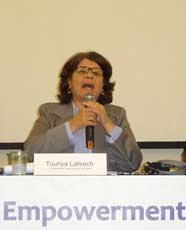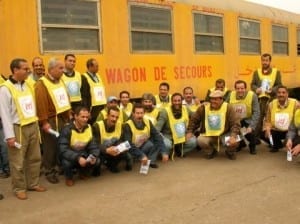Sep 27, 2013

Morocco union leader Touriya Lahrech will join women unionists at a gender equality conference in Casablanca. Credit Tula Connell/Solidarity Center
Nearly two dozen women trade unionists from Algeria, Egypt, Jordan, Tunisia and Palestine are set to meet next week for a unique skills-building and strategy conference in Casablanca, Morocco.
The Solidarity Center-sponsored Women’s Regional Advocacy Conference for the Middle East and North Africa region will bring together women leaders from seven union bodies to hone concrete skills, such as communications outreach and message development, and to support union-building initiatives that women leaders have identified as most important. Women representing the gamut of workers—from public sector employees to those toiling on farms—will share and learn strategies for strengthening women’s voices in their unions, their workplaces and in society.
The Sept. 30–Oct 1 conference continues the Solidarity Center’s series of trainings with union partners around the world. The Solidarity Center is committed to helping train women activists to become more effective advocates for gender equality at the bargaining table and within union structures.
In July, the Solidarity Center hosted more than 100 labor and community activists from 20 countries for the two-day conference, “Women’s Empowerment, Gender Equality and Labor Rights: Transforming the Terrain.” Touriya Lahrech was among those taking part, and she will welcome participants to the Casablanca conference. Lahrech is coordinator of the Women’s Department at the Confederation Democratique du Travail in Morocco.
Participating union bodies include: the Egyptian Democratic Labor Congress (EDLC); the Egyptian Federation of Independent Trade Unions (EFITU); the Federation of Independent Trade Unions of Jordan (FITU); the Palestinian General Federation of Trade Unions (PGFTU); Algeria’s SNAPAP; and the Union Générale Tunisienne de Travail (UGTT).
Jul 31, 2013
Working in large-scale agriculture creates a whole new set of challenges for women—exposure to harsh pesticides and chemicals, isolation, sexual harassment and violence and a production quota that seeks to “turn women into machines.” But women in agriculture also have the opportunity to earn wages that can better themselves and their families, said Samantha Tate, Solidarity Center country program director for Peru.
Tate opened the Tuesday afternoon plenary session at the Solidarity Center conference in São Paulo, Brazil, “Women’s Empowerment, Gender Equality and Labor Rights: Transforming the Terrain,” where 100 union and community activists from 20 countries are meeting to share strategies, network and build collective strength.
At the plenary, “Women Worker Rights in Agriculture: the Reality, Challenges and Opportunities,” four women working to empower female agricultural workers—in Peru, Honduras, Morocco and Brazil—discussed the hardships of women agricultural workers and the successes they have achieved.
“While the sector grows and grows, we as workers are not growing,” said Rosa Julia Perez Aguilar, secretary of women’s, child and adolescent affairs at the union confederation, FENTAGRO, in Peru. Although the monthly salary for a woman working in agriculture is $234, a family of five in Peru needs a minimum $546 a month to live, she said. Salaries are so low, “children are forced to work” to enable families to survive—and as a result, they receive little or no education, perpetuating the cycle of poverty.
Women in all four countries face similar struggles and, in words of Alessandra da Costa Lunes, are fighting to “break the invisibility.”
“Overcoming inequality will mean full citizenship for women,” says Costa, vice president and women’s security at CONTAG, a 22 million-member union confederation in Brazil.
In Central America, Irís Munguía is among those holding leadership trainings and empowering women in the banana, pineapple and sugar cane industries to take on important roles in their unions and their communities. Munguía, the first female coordinator of COLSIBA, the Latin American coordinating body of agricultural unions, also has helped spearhead a contract framework agreement for multiple Central and South American nations that women can adapt during bargaining.
In Morocco, women working in agriculture in Morocco are taking part in unique trainings tailored for a workforce with low literacy, said Touriya Lahrech, coordinator of the Confederation Democratique du Travail (CDT). In turn, these women go on to train other women in isolated rural areas about such issues as the involvement of international financial institutions in their local economies, a situation “not unique to Morocco but … a shared reality with other women, the fruit of economic policies that deny women their social and economic rights.”
And in Brazil, union women taking part in the gender equality conference plenary session now have a new network of sisters and brothers in working in agriculture from around the world.
Says Lahrech: “The moment we go back to our countries, I will tell my colleagues and sisters we are not alone. Our solidarity as women coming from across the globe can only move forward our positions as women.”
Jul 12, 2013

Members of UMT in Morocco back workers in Fez who are seeking to form a union. Credit: ITF
The Moroccan workers federation, UMT, is condemning an attack on workers and their families in Fez during a peaceful sit-in this week.
On July 8, security forces physically assaulted the workers, employed by City Bus, as they protested the company’s firing of workers who sought to form a union. Their spouses and children also may have been injured, according to the International Transport Workers Federation (ITF). In addition, police arrested two UMT staff, Aziz Bounar and Ahmed Nacer.
The workers say that after City Bus was contracted to manage urban transportation in Fez last September, working conditions have deteriorated and their efforts to form a union have been met with strike-breaking and the use of police to remove striking workers.
The City Bus workers have received support from transport unions, which joined in solidarity rallies with the workers this spring, and the ITF, which has written to the Moroccan government to call for justice for the workers.
The UMT says it “strongly condemns this violent attack on innocent workers,” and is demanding that “the government and the public authorities intervene urgently to release the persons arrested and to reinstate the sacked workers to their jobs.”


